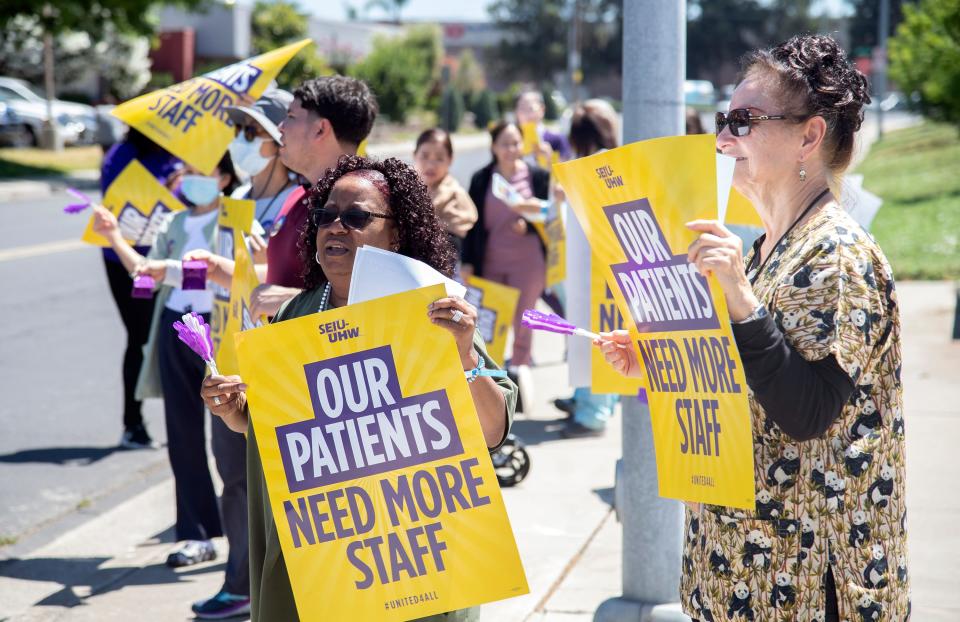Why some Pueblo healthcare workers might go on strike this week
Workers have been mobilizing across the country this year in a recent swell in union activity.
Some of the workers at healthcare provider Kaiser Permanente could join the wave of labor action and strike next week. Kaiser operates medical facilities up and down the Front Range, including two in Pueblo.
Over 99% of the Kaiser employees in Colorado, represented by the Service Employees International Union, voted earlier this month to authorize a three-day strike pending the result of contract negotiations.
But negotiations were still ongoing as of the Chieftain’s Friday afternoon deadline, so a strike isn’t guaranteed.

The biggest reasons that negotiations are held up are because of wage increases and a “staffing crisis”, SIEU Local 105 President Stephanie Felix-Sowy told the Chieftain Friday afternoon. Felix-Sowy was reached in California, where she was bargaining alongside representatives from other unions with Kaiser executives on a new contract to replace the current one that expired Saturday.
There are over 85,000 guild-represented workers at Kaiser facilities in eight states and Washington D.C. who could strike next week.
“While a strike threat is disappointing, it does not necessarily mean a strike will happen. We take any threat to disrupt care for our members seriously and have plans in place to ensure we can continue to provide high-quality care should a strike actually occur next week,” Kaiser said in a statement provided to the Chieftain.
Why workers voted to strike
SIEU Local 105 represents over 3,000 healthcare workers at Kaiser facilities in Colorado, including nurses, medical assistants, pharmacy technicians, schedulers, transportation staff, and laboratory workers.
In Pueblo, that includes eight workers at Kaiser’s Acero medical clinic and 12 workers at the Pueblo North facility, according to an SIEU spokesperson.
Emily Berrera lives in northern Pueblo County and works as a medical assistant at a Colorado Springs Kaiser facility. She told the Chieftain on her Friday lunch break that she supported authorizing the strike because she wanted to hold out for a better long-term wage increase.
“I know these three days of our strike financially are going to hit me, but I would rather take that three-day hit than suffer the next four years and accept a mediocre offer from Kaiser execs,” Berrera said.
Kaiser had previously offered a 12% wage increase over four years, but Felix-Sowy said that the increase isn’t enough to mitigate rising costs. The cost of living in Colorado and in other places that Kaiser is operational, such as on the west coast, has ballooned in recent years, she noted.
Felix-Sowy said the unions are hoping to get a 24% wage increase spread over four years.
Kaiser has said that their “philosophy” is to compensate workers at 10% above market rate.
How staffing shortages play a factor
Healthcare providers have struggled with staffing shortages since before the pandemic, Felix-Sowy said, but the COVID-19 pandemic “magnified” existing issues and exacerbated the problems.
Kaiser and a coalition of unions representing workers in different states reached an agreement earlier this year to hire 10,000 additional workers, according to a Kaiser statement from Sept. 22. The company said in a Friday statement that they expect to reach the goal at the end of October, “if not sooner, and we won’t stop there.”
“We are committed to addressing every area of staffing that is still challenging. We’ve also taken actions to streamline the screening, hiring and onboarding process,” the statement says.
Kaiser has said that they have hired 9,700 new workers around the country so far, but a Kaiser spokesperson was unable to confirm Friday how many of those workers have been hired in Colorado.
Berrera said that her clinic has been short-staffed all year — and that makes it so that patients have to wait longer, sometimes months, for available appointments.
“We have been short-staffed two to three people, which doesn't sound like a lot, but when there's only six of us total that's a big chunk,” Berrera said.
As a medical assistant, part of Berrera’s job is preparing patients before they see doctors, as well as helping with immunizations and vision exams as needed. When there’s two doctors at the clinics who have simultaneous appointments, she and her co-workers have more work to do in order to keep the doctors running on time.
“It gets stressful: it's definitely a lot to deal with,” Berrera said.
How a strike would affect patients in Pueblo
A Kaiser spokesperson estimated that there are over 13,000 people served by Kaiser in the Pueblo area.
In a message directed to patients posted on its website, Kaiser assured patients that “we have plans in place to ensure we can continue to provide you high-quality care should a strike actually occur.”
“In the event of a strike, our facilities will continue to be staffed by our physicians and other care professionals, along with trained and experienced managers and contingency staff,” according to the alert.
Anna Lynn Winfrey covers politics for the Pueblo Chieftain. She can be reached at awinfrey@gannett.com. Please support local news at subscribe.chieftain.com.
This article originally appeared on The Pueblo Chieftain: Why some Pueblo healthcare workers might go on strike this week

